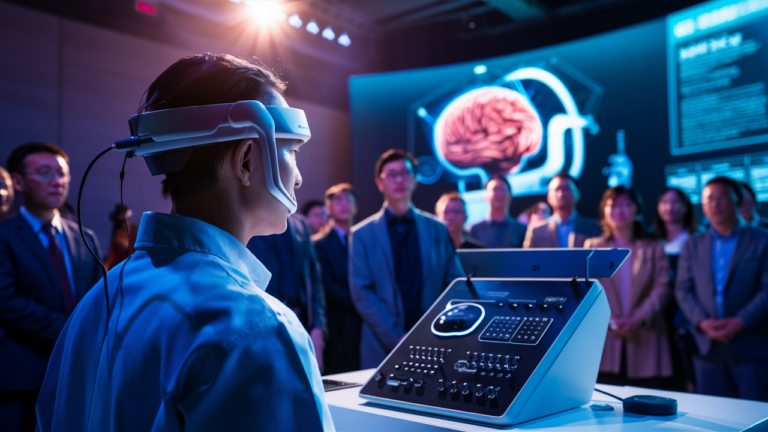Tech moves fast—stay faster.
Tech moves fast—stay faster.
China Successfully Tests Brain-Computer Interface, Becomes 2nd Nation in BCI Race


By Farhan Ali • June 23, 2025
China has become the second nation in the world to successfully conduct a clinical trial of a brain-computer interface (BCI) system, marking a dramatic escalation in the race for neurological dominance. The breakthrough follows years of research by the Chinese Academy of Sciences and multiple government-linked biotech firms.
What Was Achieved?
In the recently reported trial, Chinese scientists implanted a neural device in a patient that allowed brain signals to control an external machine—a robotic arm. According to early results, the patient demonstrated control of digital movements through thought alone, without verbal commands or physical gestures.
How It Compares to the U.S.
- Neuralink (U.S.): Elon Musk’s company has implanted chips in human patients and achieved typing and object control through neural activity.
- Synchron (U.S.): Uses minimally invasive stentrode implants and has reached clinical-stage application for paralysis.
- China’s BCI Program: Now entering competitive territory, with state-backed support, centralized research labs, and direct links to national defense innovation.

Strategic Implications
This isn’t just about medical science. BCIs are viewed as the next leap in human–machine symbiosis, and China’s entry poses significant implications for:
- Military applications: Cognitive augmentation, remote piloting, real-time translation.
- Healthcare modernization: Stroke rehab, prosthetics, neurotherapy.
- AI integration: Faster data relay between humans and algorithms.
What’s Next?
China’s National Neurotech Plan (part of its 2035 vision) aims to roll out commercial BCI applications within five years, including brain-controlled wheelchairs, smart prosthetics, and “mind typing” wearables. Global observers now anticipate a tighter regulatory, ethical, and innovation race among tech superpowers.

Conclusion
The BCI frontier is no longer theoretical—it’s geopolitical. As China joins the U.S. at the forefront of brain-embedded computing, the global race for neural dominance has officially begun.
Additional References:
- Bloomberg Business (@bloombergbusiness)
- Global Times China (@globaltimesnews)
- South China Morning Post (@scmpnews)
- Neuroscience News (@neurosciencenews)
- IEEE Spectrum (@ieeespectrum)
Explore more
UK’s ARIA Pumps £800M into High-Risk, High-Reward Science—From Robotics to Biofabrication
By Farhan Ali • June 23, 2025 The UK is placing a...
Quantum Leap: Osaka University Scientists Create Cleaner, Faster “Magic States” for Fault-Tolerant Computing
By Farhan Ali • June 23, 2025 In a landmark study, researchers...
China Just Switched On the World’s First Thorium Nuclear Reactor—Here’s Why That Matters
By Farhan Ali • June 23, 2025 China has officially brought online...
Indonesia Eyes Nuclear Partnerships with China and Russia After Discovering Massive Uranium Reserve
By Farhan Ali • June 23, 2025 Indonesia is actively considering partnerships...















Leave a comment